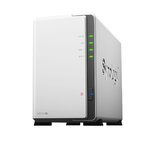Okay you IT gurus on the site, I have some questions for you regarding NAS (Network Attached Storage). I would like to set up a NAS at my home for a few things - primarily to be a shared storage location for files for our laptops and other connected devices. Secondly, I'd like it to be accessible when I'm away from home. Third, I may want to use it for storing media for streaming on devices at home like a Roku player, etc.
I'm not a complete newb when it comes to computers, but when it gets into networking it starts to get to the edge of my knowledge base.
I do a lot of photos and videos, so my storage needs are high. I've got several 1 and 2 TB external drives I use to store files and backups - I also make BR backups as files as well. That's all fine and good, but it's a pain to dig out the the external HDD when I want to find a particular file. I would like to have one place to store it all, and be able to access it from multiple devices and locations. I've begun looking at 2-4 bay NAS devices that could hold a couple of HDD's, say up to 10TB each. I don't want to spent $1k to make this happen, I'd like to keep it affordable, but reliable.
A few years ago, I had a setup with an external 1TB HDD tied to a small server/box that tied to my DSL router. It worked okay for a while, but was slow and both the HDD and the server failed - I lost most of the files on my HDD. I don't want a repeat of that again.
I would love to have a RAID setup (with full redundancy) with 10TB of true storage, hot swappable drives and decent transfer speeds.
So some questions for you folks:
1. Is this a good way to go for storage based on what I've said I want?
2. Any recommendations for particular NAS devices, at a reasonable price?
3. Are these things difficult to set up?
4. I'm finding a lot of info online, but not sure what resources I should trust - any in particular you would recommend?
I have considered cloud storage services, but honestly, for the price and the amount of storage I'm looking for, it's way too expensive - I'd rather host it myself, if that's reasonable, safe and reliable to do so.
Here is a 2 bay unit I have been looking at for reference. It's a 2-bay unit, supports up to 16TB with RAID 0 and RAID 1 options (Model DS216j). Price seems good ($169.99 w/o drives) and reviews are 4.5 stars:

Amazon.com: Synology NAS DiskStation (DS216j): Computers & Accessories
Thoughts??
I'm not a complete newb when it comes to computers, but when it gets into networking it starts to get to the edge of my knowledge base.
I do a lot of photos and videos, so my storage needs are high. I've got several 1 and 2 TB external drives I use to store files and backups - I also make BR backups as files as well. That's all fine and good, but it's a pain to dig out the the external HDD when I want to find a particular file. I would like to have one place to store it all, and be able to access it from multiple devices and locations. I've begun looking at 2-4 bay NAS devices that could hold a couple of HDD's, say up to 10TB each. I don't want to spent $1k to make this happen, I'd like to keep it affordable, but reliable.
A few years ago, I had a setup with an external 1TB HDD tied to a small server/box that tied to my DSL router. It worked okay for a while, but was slow and both the HDD and the server failed - I lost most of the files on my HDD. I don't want a repeat of that again.
I would love to have a RAID setup (with full redundancy) with 10TB of true storage, hot swappable drives and decent transfer speeds.
So some questions for you folks:
1. Is this a good way to go for storage based on what I've said I want?
2. Any recommendations for particular NAS devices, at a reasonable price?
3. Are these things difficult to set up?
4. I'm finding a lot of info online, but not sure what resources I should trust - any in particular you would recommend?
I have considered cloud storage services, but honestly, for the price and the amount of storage I'm looking for, it's way too expensive - I'd rather host it myself, if that's reasonable, safe and reliable to do so.
Here is a 2 bay unit I have been looking at for reference. It's a 2-bay unit, supports up to 16TB with RAID 0 and RAID 1 options (Model DS216j). Price seems good ($169.99 w/o drives) and reviews are 4.5 stars:

Amazon.com: Synology NAS DiskStation (DS216j): Computers & Accessories
Thoughts??











